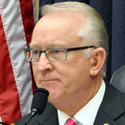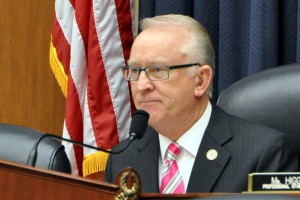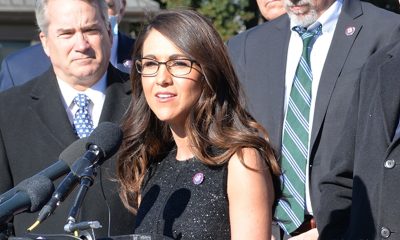National
McKeon threatens to kill defense bill over same-sex weddings
Republican doesn’t want military chaplains to officiate over same-sex marriages

The leading House Republican on defense issues has threatened to kill passage of annual defense policy legislation if it lacks language blocking military chaplains from performing same-sex weddings.
House Armed Services Committee Chair Buck McKeon (R-Calif.) said Friday in a taped interview on C-SPAN’s “Newsmakers” that he’d rather see no version of the fiscal year 2012 defense authorization bill passed at all rather one that doesn’t prevent chaplains from marrying gay couples, according to the The Hill newspaper.
“This was one of the concerns that we had – that we were rushing this, to eliminate this, before we had fully prepared things, and DOMA is the law of the land,” McKeon said, referencing the Defense of Marriage Act, the 1996 law prohibiting federal recognition of same-sex marriage.
Last week, the Pentagon issued guidance allowing chaplains to perform same-sex weddings, if they so choose, and allowing the use of base facilities for these ceremonies.
The House in May approved a version of the defense bill that would rollback the Pentagon guidance by prohibiting chaplains or base facilities from being involved in same-sex weddings. The provision was adopted in committee as an amendment by Rep. W. Todd Akin (R-Mo.)
The measure also contains language reaffirming the Defense Department must abide by DOMA. The language was also adopted in committee as an amendment by Rep. Vicky Hartzler (R-Mo.)
The Senate Armed Services Committee in June left out these provisions in its version of the defense bill, but the full measure has yet to reach the Senate floor.
McKeon also reportedly said he’d rather see Congress fail to pass a defense measure for the first time in a half-century if he had to give in on a provision in the Senate bill effectively banning many terrorism suspects from obtaining trials in civilian court.
McKeon reportedly said he hopes the Senate will come to the side of the House on the marriage and detainee issues.
Specifically on marriage, McKeon reportedly said, “I’m hopeful that the Senate will look at those votes and will understand our feelings on this issue.”
Aubrey Sarvis, executive director of the Servicemembers Legal Defense Network, chastised McKeon for saying he’d put the Pentagon budget at risk over the ability of chaplains to perform same-sex marriages.
“It’s nothing short of shameful that the Chair of the House Armed Services Committee, charged with protecting and authorizing funding for our nation’s service members at war, would be willing to put at risk the equipment and supplies they need in order to advance his own narrow, social agenda,” Sarvis said.
If the full Senate passes the measure as approved by the Senate Armed Services Committee, the marriage issues would have to be hammered out between the House and Senate in conference committee.
In a news conference last month, Senate Armed Services Committee Chair Carl Levin (D-Mich.) pledged to work against the anti-gay provisions from being part of the defense bill when asked about the issue by The Advocate.
“We will fight against those amendments and do everything we can to make sure that they don’t appear either in the Senate bill or on the floor,” as well as in conference committee for the bill, Levin said.
The Pentagon guidance allowing chaplains to officiate over same-sex weddings has become a rallying cry for social conservatives seeking unseat President Obama during the 2012 election.
During the 2011 Value Voters Summit, Republican presidential candidate Rick Santorum mischaracterized the guidance by saying the Obama administration “instructed” chaplains to perform these same-sex weddings when in fact they have option to do so.
Santorum added this decision from Obama is “worse than” his decision to abandon defense of DOMA in court.
“He has instructed his military chaplains to marry people, in direct contravention — marry gays and lesbians in direct contravention to the Defense of Marriage Act, which defines marriage in federal law as between a man and a woman,” Santorum said. “So not only did the president not defend the law, he has now instructed people in the military to break the law.
LGBT advocates have said allowing military chaplains to marry same-sex couples is consistent with DOMA because the anti-gay law makes no mention of couples that chaplains are able to marry.
Former Army Lt. Gen. Benjamin Mixon, who came under fire last year for speaking out against open service and asking people to call on Congress to reject “Don’t Ask, Don’t Tell” repeal, also decried the guidance during the summit.
“What kind of position is this to put chaplains in to have to make that kind of decision inside this unit?” Mixon said. “It is unfair to our service members to put them in that kind of position whether it would be a violation of their religious beliefs of their moral conscience. We owe our service members more than that, and we need to work to provide that guidance and oversight to each and every one of our service members.”
State Department
State Department releases annual human rights report
Antony Blinken reiterates criticism of Uganda’s Anti-Homosexuality Act

Secretary of State Antony Blinken on Monday once again reiterated his criticism of Uganda’s Anti-Homosexuality Act upon release of the State Department’s annual human rights report.
“This year’s report also captures human rights abuses against members of vulnerable communities,” he told reporters. “In Afghanistan, the Taliban have limited work opportunities for women, shuttered institutions found educating girls, and increasing floggings for women and men accused of, quote, ‘immoral behavior,’ end quote. Uganda passed a draconian and discriminatory Anti-Homosexuality Act, threatening LGBTQI+ individuals with life imprisonment, even death, simply for being with the person they loved.”
Ugandan President Yoweri Museveni last May signed the law, which contains a death penalty provision for “aggravated homosexuality.”
The U.S. subsequently imposed visa restrictions on Ugandan officials and removed the country from a program that allows sub-Saharan African countries to trade duty-free with the U.S. The World Bank Group also announced the suspension of new loans to Uganda.
Uganda’s Constitutional Court earlier this month refused to “nullify the Anti-Homosexuality Act in its totality.” More than a dozen Ugandan LGBTQ activists have appealed the ruling.
Clare Byarugaba of Chapter Four Uganda, a Ugandan LGBTQ rights group, on Monday met with National Security Council Chief-of-Staff Curtis Ried. Jay Gilliam, the senior LGBTQI+ coordinator for the U.S. Agency for International Development, in February traveled to Uganda and met with LGBTQ activists who discussed the Anti-Homosexuality Act’s impact.
“LGBTQI+ activists reported police arrested numerous individuals on the basis of their sexual orientation or gender identity and subjected many to forced anal exams, a medically discredited practice with no evidentiary value that was considered a form of cruel, inhuman, and degrading treatment and could amount to torture,” reads the human rights report.
The report, among other things, also notes Ugandan human rights activists “reported numerous instances of state and non-state actor violence and harassment against LGBTQI+ persons and noted authorities did not adequately investigate the cases.”
Report highlights anti-LGBTQ crackdowns in Ghana, Hungary, Russia
Ghanaian lawmakers on Feb. 28 approved the Promotion of Proper Human Sexual Rights and Ghanaian Family Values Bill. The country’s president, Nana Akufo-Addo, has said he will not sign the measure until the Ghanaian Supreme Court rules on whether it is constitutional or not.
The human rights report notes “laws criminalizing consensual same-sex sexual conduct between adults” and “crimes involving violence or threats of violence targeting lesbian, gay, bisexual, transgender, queer or intersex persons” are among the “significant human rights issues” in Ghana.
The report documents Hungarian Prime Minister Viktor Orbán and members of his right-wing Fidesz party’s continued rhetoric against “gender ideology.” It also notes Russia’s ongoing crackdown against LGBTQ people that includes reports of “state actors committed violence against LGBTQI+ individuals based on their sexual orientation or gender identity, particularly in Chechnya.”
The report specifically notes Russian President Vladimir Putin on July 24 signed a law that bans “legal gender recognition, medical interventions aimed at changing the sex of a person, and gender-affirming care.” It also points out Papua New Guinea is among the countries in which consensual same-sex sexual relations remain criminalized.

The Cook Islands and Mauritius in decriminalized homosexuality in 2023.
The report notes the Namibia Supreme Court last May ruled the country must recognize same-sex marriages legally performed outside the country. The report also highlights the Indian Supreme Court’s ruling against marriage equality that it issued last October. (It later announced it would consider an appeal of the decision.)
Congress requires the State Department to release a human rights report each year.
The Biden-Harris administration in 2021 released a memorandum that committed the U.S. to promoting LGBTQ+ and intersex rights abroad.
The full report can be read here.
National
Same-sex couples vulnerable to adverse effects of climate change
Williams Institute report based on Census, federal agencies

A new report by the Williams Institute at the UCLA School of Law finds that same-sex couples are at greater risk of experiencing the adverse effects of climate change compared to different-sex couples.
LGBTQ people in same-sex couple households disproportionately live in coastal areas and cities and areas with poorer infrastructure and less access to resources, making them more vulnerable to climate hazards.
Using U.S. Census data and climate risk assessment data from NASA and the Federal Emergency Management Agency, researchers conducted a geographic analysis to assess the climate risk impacting same-sex couples. NASA’s risk assessment focuses on changes to meteorological patterns, infrastructure and built environment, and the presence of at-risk populations. FEMA’s assessment focuses on changes in the occurrence of severe weather events, accounting for at-risk populations, the availability of services, and access to resources.
Results show counties with a higher proportion of same-sex couples are, on average, at increased risk from environmental, infrastructure, and social vulnerabilities due to climate change.
“Given the disparate impact of climate change on LGBTQ populations, climate change policies, including disaster preparedness, response, and recovery plans, must address the specific needs and vulnerabilities facing LGBTQ people,” said study co-author Ari Shaw, senior fellow and director of international programs at the Williams Institute. “Policies should focus on mitigating discriminatory housing and urban development practices, making shelters safe spaces for LGBT people, and ensuring that relief aid reaches displaced LGBTQ individuals and families.”
“Factors underlying the geographic vulnerability are crucial to understanding why same-sex couples are threatened by climate change and whether the findings in our study apply to the broader LGBTQ population,” said study co-author Lindsay Mahowald, research data analyst at the Williams Institute. “More research is needed to examine how disparities in housing, employment, and health care among LGBT people compound the geographic vulnerabilities to climate change.”
Read the report
Federal Government
Lambda Legal praises Biden-Harris administration’s finalized Title IX regulations
New rules to take effect Aug. 1

The Biden-Harris administration’s revised Title IX policy “protects LGBTQ+ students from discrimination and other abuse,” Lambda Legal said in a statement praising the U.S. Department of Education’s issuance of the final rule on Friday.
Slated to take effect on Aug. 1, the new regulations constitute an expansion of the 1972 Title IX civil rights law, which prohibits sex-based discrimination in education programs that receive federal funding.
Pursuant to the U.S. Supreme Court’s ruling in the landmark 2020 Bostock v. Clayton County case, the department’s revised policy clarifies that discrimination on the basis of sexual orientation and gender identity constitutes sex-based discrimination as defined under the law.
“These regulations make it crystal clear that everyone can access schools that are safe, welcoming and that respect their rights,” Education Secretary Miguel Cardona said during a call with reporters on Thursday.
While the new rule does not provide guidance on whether schools must allow transgender students to play on sports teams corresponding with their gender identity to comply with Title IX, the question is addressed in a separate rule proposed by the agency in April.
The administration’s new policy also reverses some Trump-era Title IX rules governing how schools must respond to reports of sexual harassment and sexual assault, which were widely seen as imbalanced in favor of the accused.
Jennifer Klein, the director of the White House Gender Policy Council, said during Thursday’s call that the department sought to strike a balance with respect to these issues, “reaffirming our longstanding commitment to fundamental fairness.”
“We applaud the Biden administration’s action to rescind the legally unsound, cruel, and dangerous sexual harassment and assault rule of the previous administration,” Lambda Legal Nonbinary and Transgender Rights Project Director Sasha Buchert said in the group’s statement on Friday.
“Today’s rule instead appropriately underscores that Title IX’s civil rights protections clearly cover LGBTQ+ students, as well as survivors and pregnant and parenting students across race and gender identity,” she said. “Schools must be places where students can learn and thrive free of harassment, discrimination, and other abuse.”
-

 District of Columbia5 days ago
District of Columbia5 days agoNew D.C. LGBTQ+ bar Crush set to open April 19
-

 South America3 days ago
South America3 days agoDaniel Zamudio murderer’s parole request denied
-

 Maryland4 days ago
Maryland4 days agoMontgomery County police chief discusses arrest of trans student charged with planned school shooting
-

 Movies5 days ago
Movies5 days agoAfter 25 years, a forgotten queer classic reemerges in 4K glory













